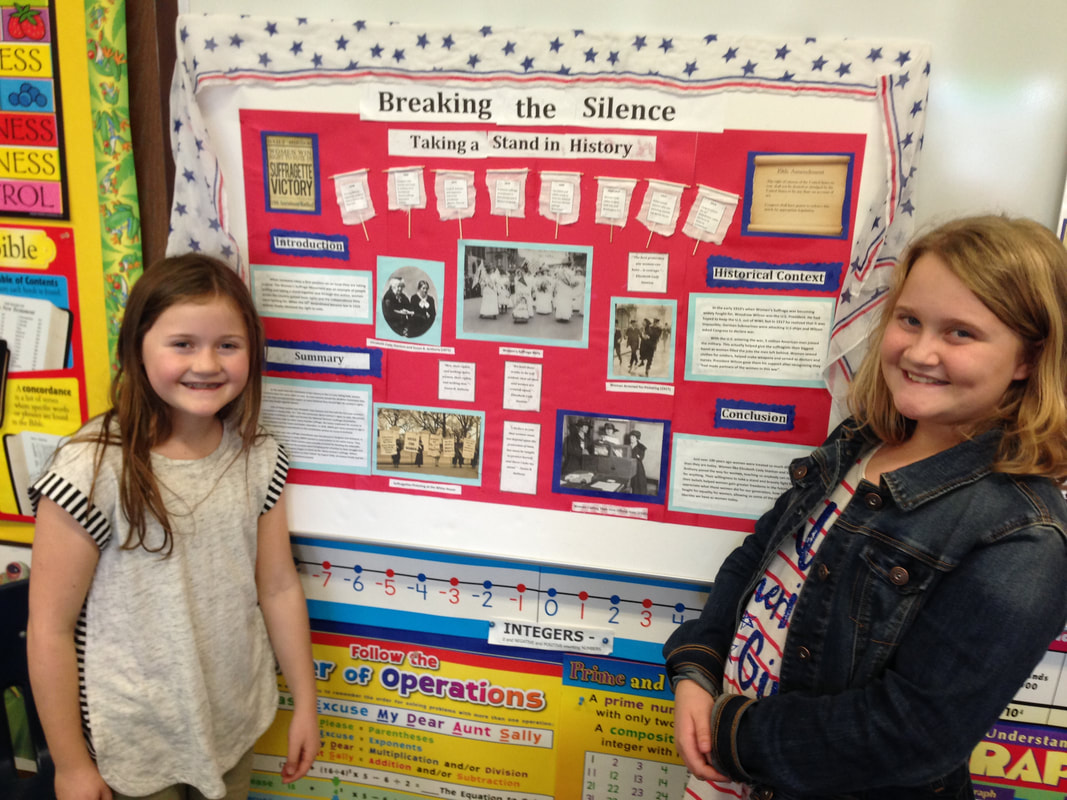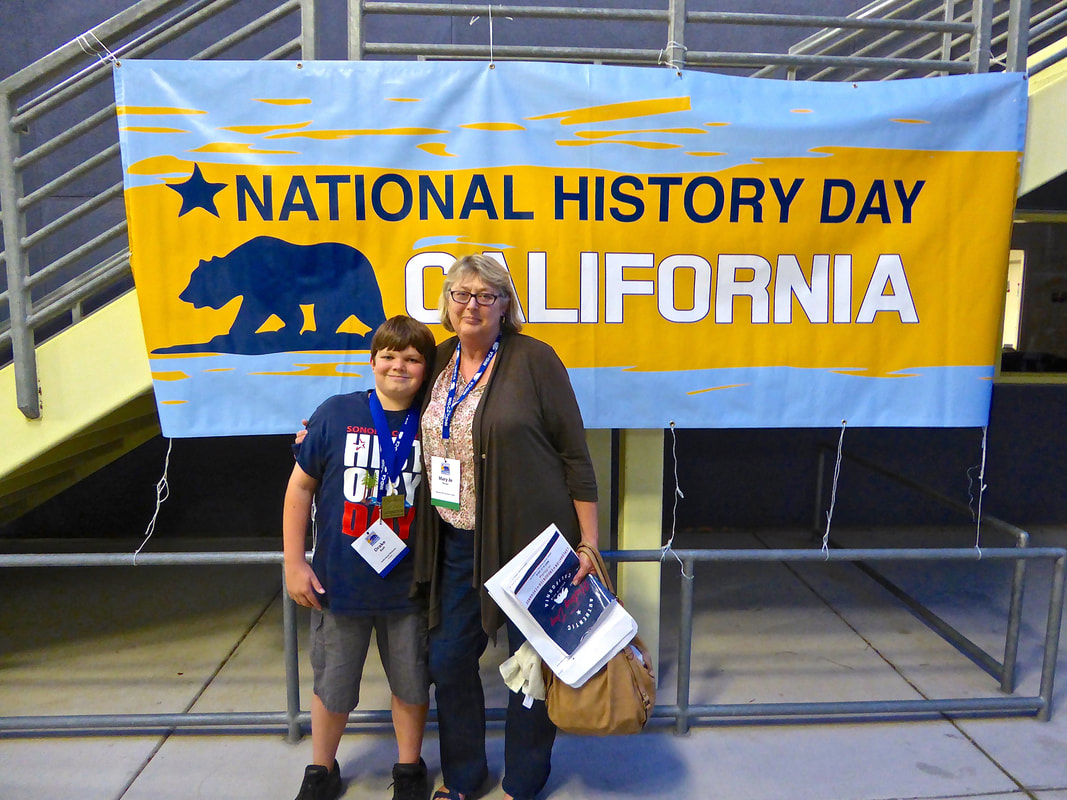By PHCS parent Dennis Bolt
Every elementary and middle school parent has the experience of their child bringing home the dreaded assignment sheet for that big school project. Be it the science fair, book report, or history diorama, many parents might dread it more than taxes! As the father of three boys who have gone through Pleasant Hill Christian School, I’ve seen it all, especially now that my youngest is in 5th grade. But I’ll be honest and say that I’m a bit of a project-nerd, so I have a more positive attitude about it. That largely is because I have grown to see the benefits of these projects, especially the National History Day project that the 4th-6th graders at PHCS complete every year.
For those who don’t know, National History Day is like a science fair, but focused on history. As the name suggests, it’s a national program/competition for students in the 4th-12th grades. At PHCS, Ms. Kinser has been doing it for several decades, and her students have gone on to compete at the county level, state level, and even the national level. The main elements of NHD are: research on a topic, fitting it to the annual theme (2019 is “Triumph and Tragedy in History”), and then making a project poster, 3-D display, paper, website, video documentary or performance. The main emphasis is finding strong primary sources, which are books written at the time, periodicals, letters, people alive at the time, photos, etc.
Bringing it back to the trenches of elementary school kids and families, I have found that these are the main benefits for a young person:
So, how do we, as parents, help our kids with their projects?
I think the first thing to do is help your child break down the deadlines. Sit down and map out when the project is due, and make smaller deadlines. Don’t cram it all in the last weekend before its due, but try to spend 30 minutes a day, or small chunks more often. This concept will carry over to anything like music practice, exercise, memorization etc. Kids need to learn this early. Secondly, as parents you need to be enthusiastic about their work, since if they see you being negative about it, they will assume that is the right way to approach hard work.
To learn more about National History Day click here.
To learn more about PHCS’s extra academic activities like History Day click here.
Every elementary and middle school parent has the experience of their child bringing home the dreaded assignment sheet for that big school project. Be it the science fair, book report, or history diorama, many parents might dread it more than taxes! As the father of three boys who have gone through Pleasant Hill Christian School, I’ve seen it all, especially now that my youngest is in 5th grade. But I’ll be honest and say that I’m a bit of a project-nerd, so I have a more positive attitude about it. That largely is because I have grown to see the benefits of these projects, especially the National History Day project that the 4th-6th graders at PHCS complete every year.
For those who don’t know, National History Day is like a science fair, but focused on history. As the name suggests, it’s a national program/competition for students in the 4th-12th grades. At PHCS, Ms. Kinser has been doing it for several decades, and her students have gone on to compete at the county level, state level, and even the national level. The main elements of NHD are: research on a topic, fitting it to the annual theme (2019 is “Triumph and Tragedy in History”), and then making a project poster, 3-D display, paper, website, video documentary or performance. The main emphasis is finding strong primary sources, which are books written at the time, periodicals, letters, people alive at the time, photos, etc.
Bringing it back to the trenches of elementary school kids and families, I have found that these are the main benefits for a young person:
- Go to the Source: This element might be the hardest for an 11-year-old, but in this day-and-age, it may be the most important. With “fake news” and “information” readily available online, it is tempting to believe anybody or rely on the first thing you learn about a topic, whether it is history or current events. NHD stresses getting deeper into a topic by looking for the original source of the info and not just reading the Wikipedia page or the Google synopsis of an event. Find the person’s actual writings in a book or in a digital version at the National Archives or some credible source. Reach out and talk to a living expert. One of my sons did a project on the Space Race and he was able to email two astronauts who walked on the moon. It’s amazing how open these important people are when they are talking to a 5th grader! So the main lesson that NHD taught my kids was to go deeper in research and analysis, which is not a common trait at this age.
- Project Management: All of these big projects have something in common: deadlines! And if there is one thing that all of us adults know is that deadlines and projects are even more important at our job. While it’s fun to do a project about Pearl Harbor, the most important skill that the kids learn is how to take a large project apart into smaller digestible bits and meet a deadline. If your child remembers anything about your NHD project, it is learning how to manage the many moving parts.
- Making Connections: The previous two points are probably the most applicable to adulthood, but this one is the most satisfying. NHD tries to get kids to look at events as connected to other events. Nothing exists in isolation. Their topic happened because of a previous event, and then that event had ripples that extended into the future. Learning cause-and-effect is very important for this generation. It may be cliched, but if you do not learn from past mistakes, you are destined to repeat them.
So, how do we, as parents, help our kids with their projects?
I think the first thing to do is help your child break down the deadlines. Sit down and map out when the project is due, and make smaller deadlines. Don’t cram it all in the last weekend before its due, but try to spend 30 minutes a day, or small chunks more often. This concept will carry over to anything like music practice, exercise, memorization etc. Kids need to learn this early. Secondly, as parents you need to be enthusiastic about their work, since if they see you being negative about it, they will assume that is the right way to approach hard work.
To learn more about National History Day click here.
To learn more about PHCS’s extra academic activities like History Day click here.



 RSS Feed
RSS Feed